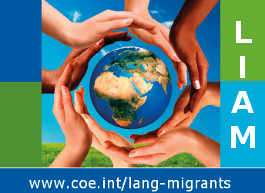Context and objectives of the LIAM project
Introduction
The Council of Europe’s primary aim is to create a common democratic and legal area throughout the continent, ensuring respect for human rights, democracy and the rule of law. All the Council of Europe’s actions are shaped by these values and by an enduring concern with social inclusion, social cohesion and respect for diversity; hence its interest in the linguistic integration of adult migrants.
For the past five decades, the Council of Europe’s Language Policy Programme’s achievements have significantly contributed to develop the field of language teaching and learning at the pan-European level. As part of its continuing work the project on the Linguistic Integration of Adult Migrants aims to support member states in the development of coherent and effective policies and to encourage them to review existing policies in keeping with shared Council of Europe values and principles. It also seeks to identify and share good practice, and where language tests are obligatory, to promote transparency and equity according to internationally accepted codes of practice.
Context of the LIAM Project
The Council of Europe has been a pioneer in addressing migration-related issues since 1968. It is worth noting that the first Resolution on this issue by the Committee of Ministers of the Council of Europe considers “that the home countries, immigration countries and public authorities and private bodies employing migrant workers should do their utmost to assist migrants wishing to learn the language of the reception country, and to facilitate the provision of the most effective types of language course”.
Political contexts and globalisation have had a great influence on the way approaches have developed since then. In this regard, a recent Resolution of the Council of Europe’s Parliamentary Assembly on Language tests: helping or hindering integration invites “member States of the Council of Europe … to reappraise their approach to integration”. The importance of migrants’ education has been reasserted over time [see the compilation of extracts of conventions, recommendations and resolutions].
Language is a central aspect of the many issues raised by migration, and particularly integration and maintenance of social cohesion. Indeed, access to education for migrants is particularly important.
Responding to member states’ and migrants’ needs
Increasingly, member states are making the acquisition of citizenship or the right to residence – and sometimes the right to enter the country (family reunion) - conditional on the applicant’s acquiring a certain level of competence in the national or official language.
The acquisition and evaluation of adult migrants’ communicative competences in the host country’s language(s) play a basic part in responding to challenges raised by migration and the integration of migrants in the host community. However, integration entails a great deal more than language competences, although these are an important part of it.
This was the context in which the LIAM project was launched, the aim being to give member states the means of satisfying their requirements in the matter of language teaching provision and assessment, while upholding their shared values (e.g. equity, transparency and respect for human rights).
As part of the project, three surveys were carried out in Council of Europe member states, and the findings reported at intergovernmental conferences; these made it possible to assess needs, and indicated ways in which the Council of Europe could help to meet them.
These surveys also showed that language courses for adult migrants and the assessment of their proficiency are not always dealt with by ministries of education – a point which needs to be considered.
Targeted guidelines and instruments have been prepared and made available to member states, and ongoing contacts have been maintained, with a view to closely monitoring changing needs, and proposing action to meet them.




